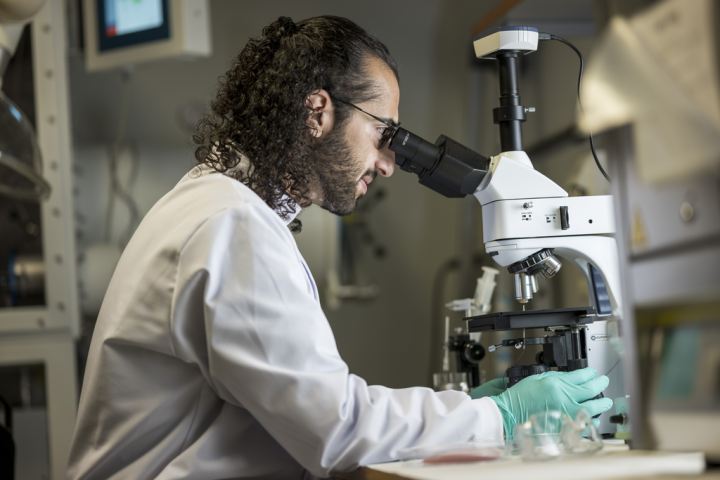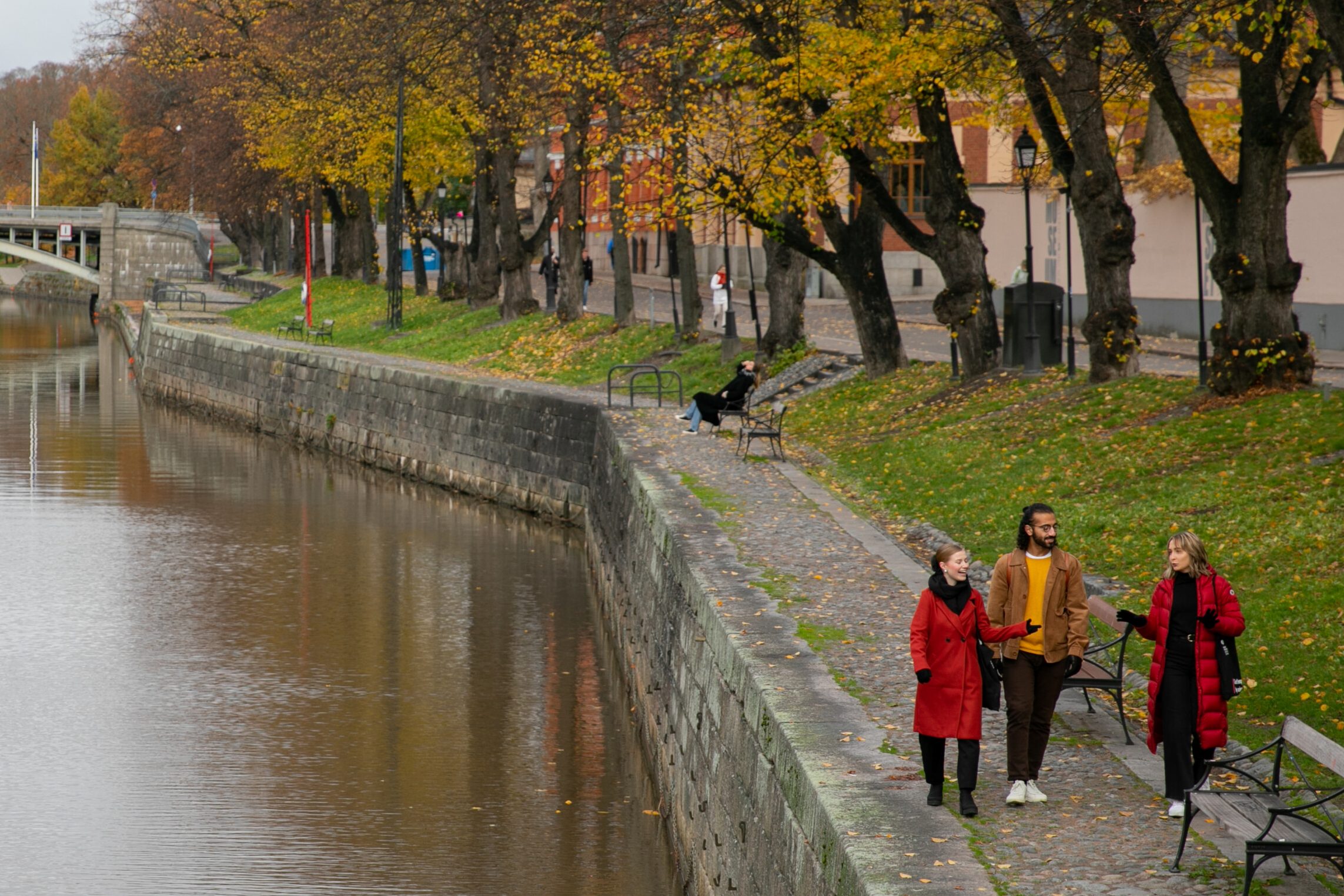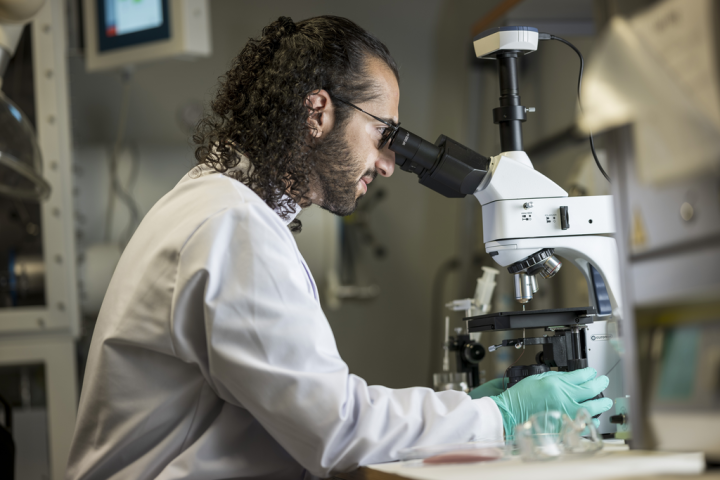The PhD experience: delving into doctoral studies with Mahdi Moghaddam
The University of Turku Graduate School (UTUGS) is an international research community of approximately 2,000 doctoral candidates. One of the current UTUGS candidates is Mahdi Moghaddam who moved to Finland to pursue a PhD in the field of electrochemistry. We sat down with Mahdi to find out what got him interested in his field of research, what is PhD student life at the University of Turku like for him and what kind of things he likes to do when he is not conducting experiments in labs.

So Mahdi, tell us a little bit about your background and interests?
I come from Iran and I did my bachelor’s at the University of Tehran. After my bachelor’s, I did my Master’s as a dual degree, studying at universities in Tehran and in Paris. And now I’m doing my PhD here in Turku.
As for my interest and my hobbies, I play music, that’s the thing that I usually do every day. My main interest is playing classical guitar as well as traditional musical instruments of Iran. And I also sing. So basically, I spent most of my free time singing and playing music. I also have a passion for interior decoration so whenever I have time, I go to visit antique stores or second-hand shops. And every few weeks I change the decoration of my apartment. I like to mix things so in my place is a mixture of modern and more traditional styles.
What about your field of research, is it connected to your hobbies?
Well, not exactly. My field of research is electrochemistry which is actually a mixture of material engineering and chemical engineering. I specifically study the electron transfer reactions in redox flow batteries. It’s mainly an experimental field so I get to do a lot of experiments in labs. I’d say approximately 60 percent of my working time is spent in labs. And the rest of the time I’m analysing the data that I’ve collected in labs.
During my bachelor’s I had an opportunity to work in a group that was working with fuel cells. And at that time, I didn’t know much about energy materials but I found it fascinating because nowadays clean energy is of interest to so many people. This is a very important topic in terms of challenges such as global warming, so I became interested in energy research and clean energy production. I started to read about energy materials and then I found a position in Finland focusing on batteries as a clean facility for providing energy. So it all started with my bachelor’s and that project of working with fuel cells.

Did you always want to pursue a PhD degree or did you have any other plans for yourself?
I’d say I didn’t really have other plans. Or my plans were not that clear. The idea of continuing to a PhD just gradually built up in my mind after doing my bachelor’s. I thought that I’d like to continue doing research, stay in academia and perhaps become a professor. And that required me to continue to my master’s and then to a PhD. But then, when I started my PhD I became more interested in discovering more about this field of science and maybe continuing as a researcher. That way I could find out more about clean energy which is really beneficial for society when thinking about challenges such as global warming.
Because of my passion for interior decoration, I’m also thinking about becoming a part-time interior decorator in addition to my career in research. I’m actually studying it in my free time to become a certified decorator. It has also given me a new perspective to look at things more visually as a researcher which has actually been very beneficial. For example, I pay more attention to the figures in my publications to make them more visually attractive.
What is a typical PhD student day like for you?
A typical day for me is that I start around 9 am and work until 5 pm. I usually start by checking emails and then I change into my lab gear and move on to work in the lab. Some days the experiments take the whole day while some other days I go back to the office to write grant proposals, prepare presentations or write a scientific paper. PhD students also have some courses to teach based on their specialities and field of studies so I have some teaching to do every now and then.
In my research, I get to work and collaborate with colleagues in different projects and publications. So part of my work is teamwork. The lab experiments I usually do alone but of course in the big picture other people also do experiments that merge with mine.
What have been the things you’ve enjoyed the most so far during your time as a PhD student at the University of Turku?
One of the highlights was taking part in the Three Minute Thesis (3MT) competition in which the participating researchers need to prepare a three-minute presentation on the topic of their research. I’ve attended two times and I find the concept so interesting because you get to know other researchers and their fields of research. It’s very challenging to fit everything into three minutes but it’s a useful experience nevertheless. I think that it’s really cool that the University of Turku provides these kinds of opportunities for students.
What have you found challenging during your time as a PhD student?
I personally haven’t encountered any major challenges. I think that the University of Turku is doing a good job of engaging international students and staff. For example, I’m part of the new Faculty of Technology and one of the great things has been that the development and recruitment processes for the faculty have been very open and transparent. I think that the efforts to incorporate international students and staff into the campus community are clear and the results speak for themselves: a record in the number of international student applications this year!
How have Finland and Turku treated you so far? Any pleasant or unpleasant surprises?
My first impression after coming to Finland was that I really loved the abundance of pine trees here! I love pine trees because of my childhood memories so it was like heaven for me when I first came here. I really like the calmness and the nature of Finland. Even though Turku is quite a big city, you can easily get into a forest in ten minutes if you want. I lived in Helsinki for a while before moving here and at first, I was a bit hesitant about moving to Turku as it is a smaller city. But now I like it more than Helsinki. The city is vibrant, everything is within a walking distance and the facilities are great.

As for challenges, winters and summers were difficult for me. During the first summer, I found it impossible to sleep because of the bright nights and birds singing all the time. It was so different from what I was used to. But now I’m really enjoying the summers here. I have thick curtains at home and earplugs to help me sleep. The first winter was also challenging but when you learn how to deal with the darkness it gets easier to manage. I now have a bright light lamp (kirkasvalo) at home to help me during the winter months.
What about life after PhD – what kind of plans do you have for your future?
I’d like to continue doing research. And maybe do some interior decoration work on the side. I think I’ll stay in Turku for some time for postdoctoral research. But after that, if I want to stay in academia I think I need to have some kind of mobility and go experience something new elsewhere at least for a while.
It’s good to remember that the future in the field of science is not that obvious for various reasons. For example, you need to secure funding to continue your research. Grant applications and proposals are important and they take quite a lot of time. Luckily, there are many organisations in Finland offering grants but the competition for those is quite high.
How would you describe the scientific community at the University of Turku?
I find the scientific community here very supportive, friendly, honest and open-minded. The University of Turku is often asking students’ and researchers’ ideas on how to improve services and other things. It feels that it really is important for the University to know what works and what should be improved.
Do you have any words of wisdom or advice to someone who is considering a doing a PhD?
My advice would be that it is very important for anyone pursuing a PhD to be prepared to experience autonomy. You need to know that when you’re doing your PhD there’s no one telling you directly what to do and it’s good to understand that early on. At the same time, autonomy is not scary. After a few failures, you’ll know what to do. But I would advise anyone considering becoming a PhD student to be mindful of the autonomy.
Chat with our current students
Ready to start your research career at the University of Turku? There are two application rounds for doctoral programmes per year, in spring and in autumn. In autumn, also funded doctoral candidate positions are open for applications. Check the application instructions and get ready to apply! www.utu.fi/applyphd
If you are interested in Master’s degree programmes, go check the list of available degree programmes at www.utu.fi/degrees and get ready to apply next January! If you would like to receive tips and deadline reminders for the Master’s application call, do subscribe to our Future with UTU newsletter.

